LAW 6001 Taxation Law Case Study: Income, Deductions, Residency in AU
VerifiedAdded on 2023/06/10
|10
|2738
|367
Case Study
AI Summary
This assignment presents a comprehensive case study focused on Australian taxation law, addressing key areas such as permanent establishment, tax residency, income sources, and allowable deductions. It examines the implications of the Income Tax Assessment Act 1936 and 1997, along with relevant case law like FCT v The Myer Emporium Ltd and Westfield Ltd v FCT, to distinguish between income and capital gains. The study also delves into the ethical responsibilities of tax agents under the Tax Agent Services Act 2009. Specific scenarios are analyzed, including the tax liabilities of foreign residents, the deductibility of interest expenses, and the application of the 'first strand' principle. The analysis provides detailed recommendations and conclusions, offering a practical understanding of taxation principles within the Australian legal framework. Desklib provides this assignment as a study resource, along with many other solved assignments and past papers.
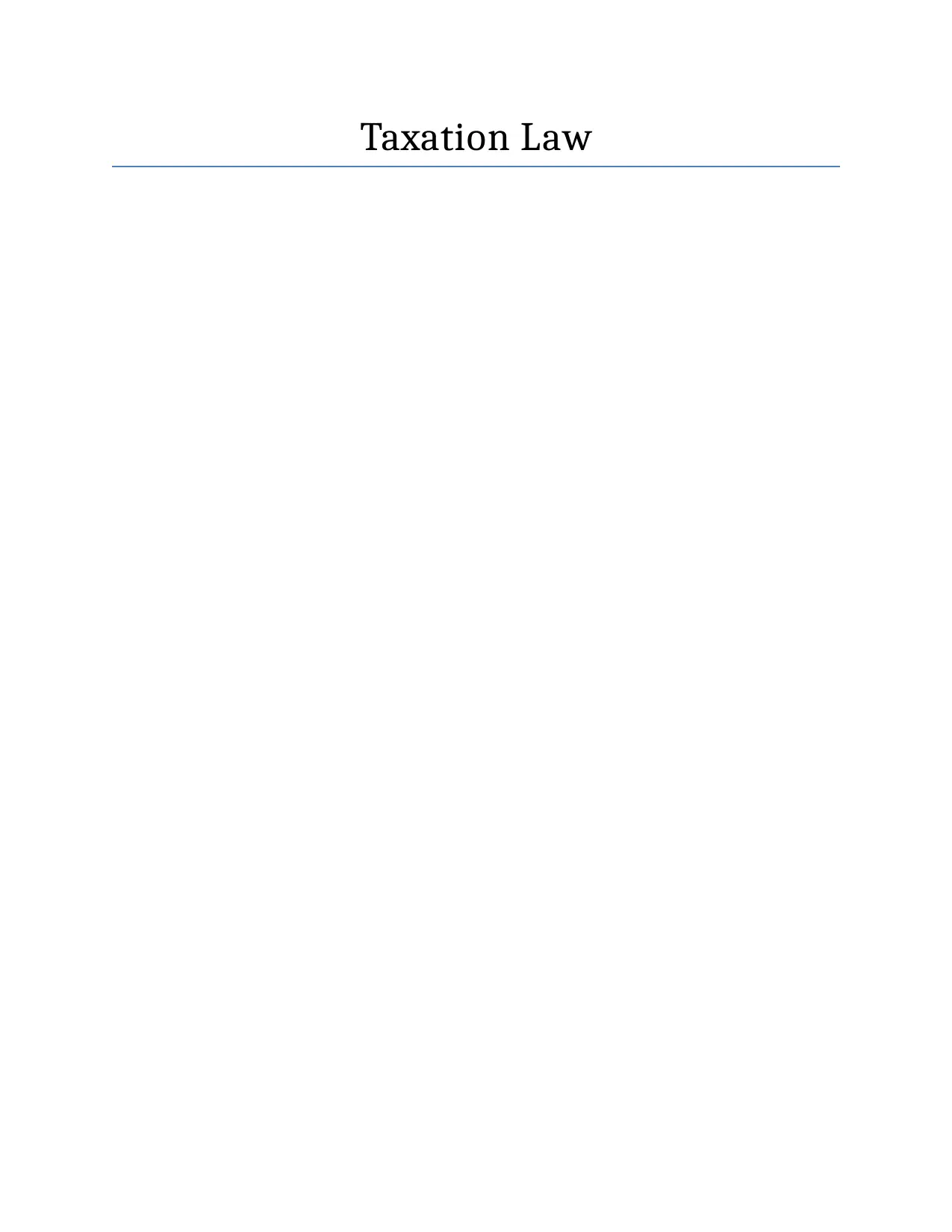
Taxation Law
Paraphrase This Document
Need a fresh take? Get an instant paraphrase of this document with our AI Paraphraser
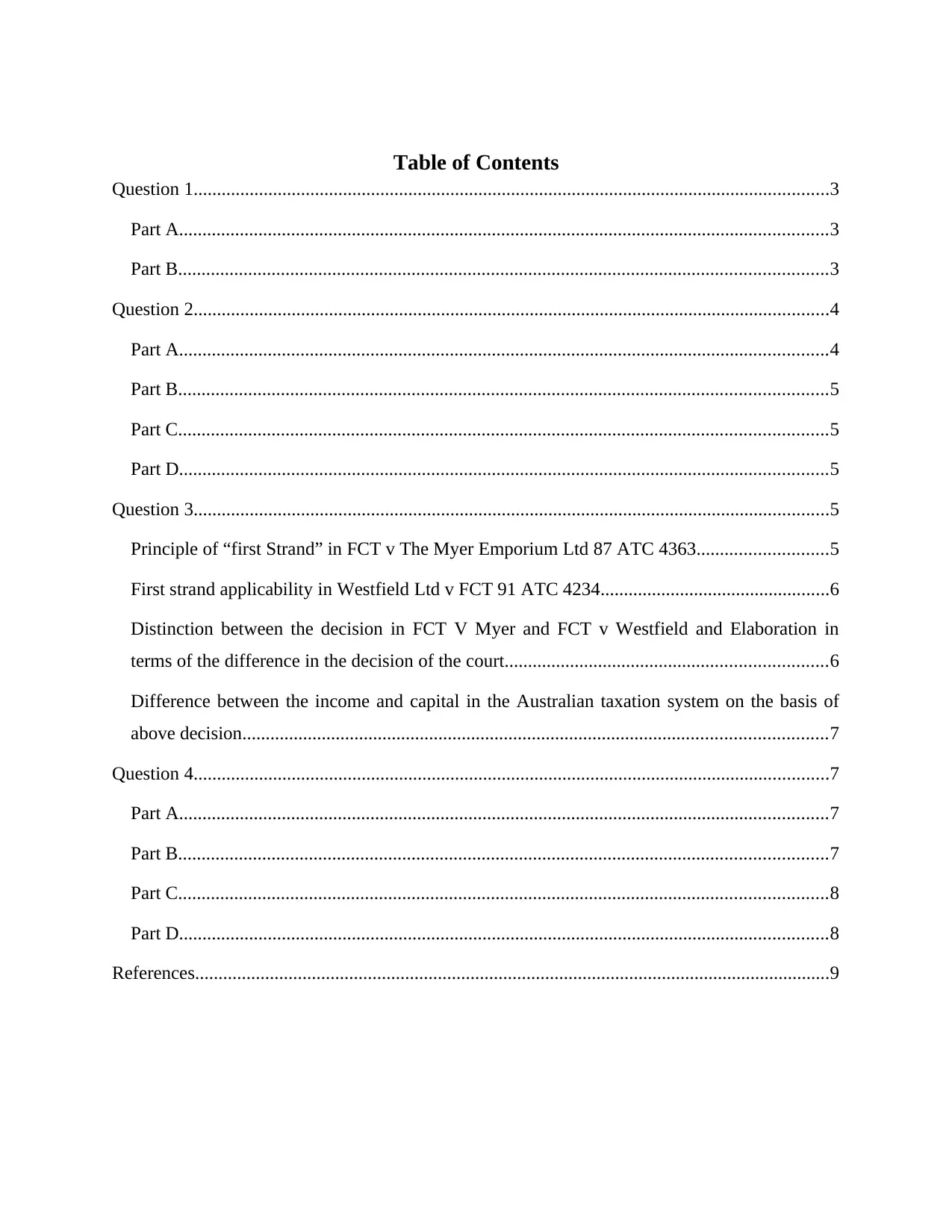
Table of Contents
Question 1........................................................................................................................................3
Part A...........................................................................................................................................3
Part B...........................................................................................................................................3
Question 2........................................................................................................................................4
Part A...........................................................................................................................................4
Part B...........................................................................................................................................5
Part C...........................................................................................................................................5
Part D...........................................................................................................................................5
Question 3........................................................................................................................................5
Principle of “first Strand” in FCT v The Myer Emporium Ltd 87 ATC 4363............................5
First strand applicability in Westfield Ltd v FCT 91 ATC 4234.................................................6
Distinction between the decision in FCT V Myer and FCT v Westfield and Elaboration in
terms of the difference in the decision of the court.....................................................................6
Difference between the income and capital in the Australian taxation system on the basis of
above decision.............................................................................................................................7
Question 4........................................................................................................................................7
Part A...........................................................................................................................................7
Part B...........................................................................................................................................7
Part C...........................................................................................................................................8
Part D...........................................................................................................................................8
References........................................................................................................................................9
Question 1........................................................................................................................................3
Part A...........................................................................................................................................3
Part B...........................................................................................................................................3
Question 2........................................................................................................................................4
Part A...........................................................................................................................................4
Part B...........................................................................................................................................5
Part C...........................................................................................................................................5
Part D...........................................................................................................................................5
Question 3........................................................................................................................................5
Principle of “first Strand” in FCT v The Myer Emporium Ltd 87 ATC 4363............................5
First strand applicability in Westfield Ltd v FCT 91 ATC 4234.................................................6
Distinction between the decision in FCT V Myer and FCT v Westfield and Elaboration in
terms of the difference in the decision of the court.....................................................................6
Difference between the income and capital in the Australian taxation system on the basis of
above decision.............................................................................................................................7
Question 4........................................................................................................................................7
Part A...........................................................................................................................................7
Part B...........................................................................................................................................7
Part C...........................................................................................................................................8
Part D...........................................................................................................................................8
References........................................................................................................................................9
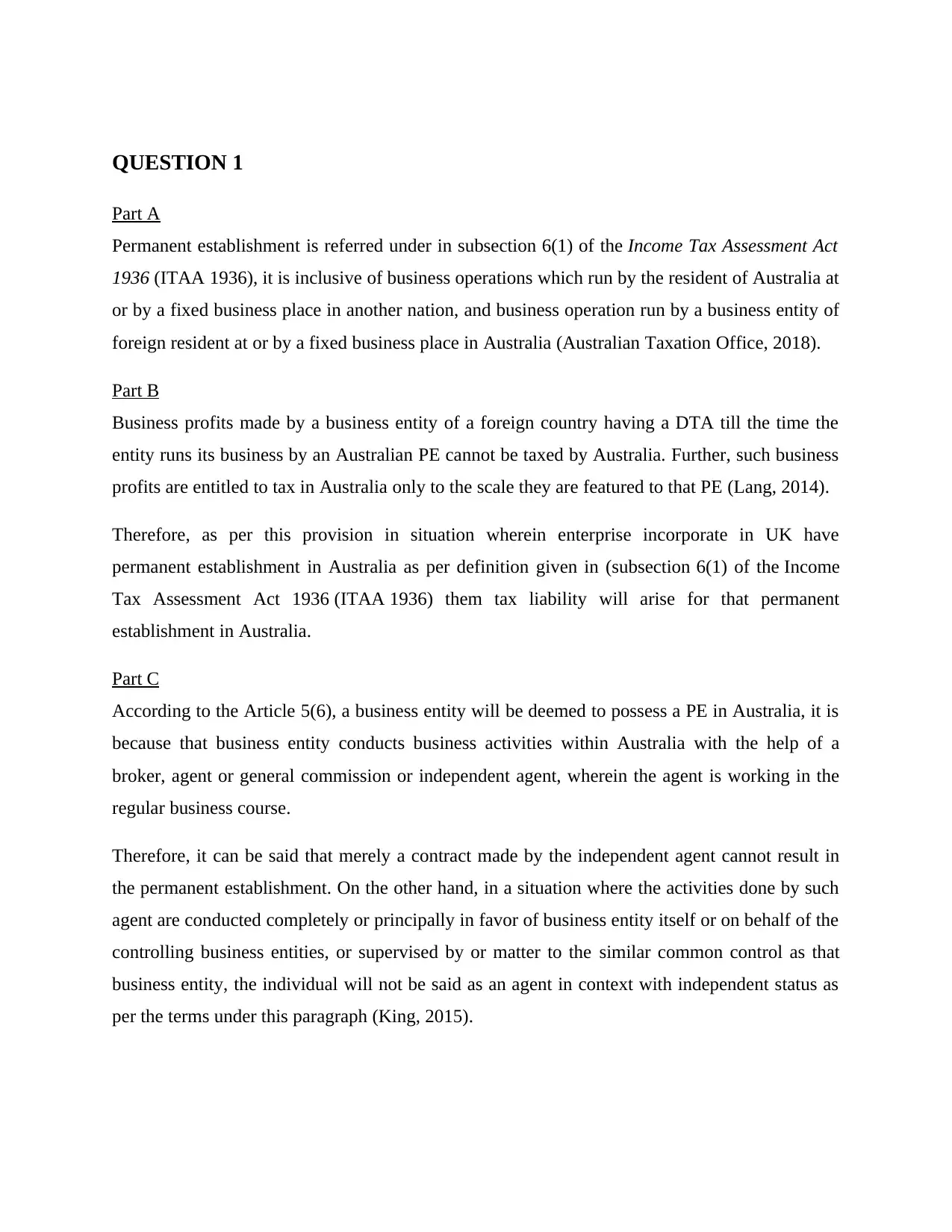
QUESTION 1
Part A
Permanent establishment is referred under in subsection 6(1) of the Income Tax Assessment Act
1936 (ITAA 1936), it is inclusive of business operations which run by the resident of Australia at
or by a fixed business place in another nation, and business operation run by a business entity of
foreign resident at or by a fixed business place in Australia (Australian Taxation Office, 2018).
Part B
Business profits made by a business entity of a foreign country having a DTA till the time the
entity runs its business by an Australian PE cannot be taxed by Australia. Further, such business
profits are entitled to tax in Australia only to the scale they are featured to that PE (Lang, 2014).
Therefore, as per this provision in situation wherein enterprise incorporate in UK have
permanent establishment in Australia as per definition given in (subsection 6(1) of the Income
Tax Assessment Act 1936 (ITAA 1936) them tax liability will arise for that permanent
establishment in Australia.
Part C
According to the Article 5(6), a business entity will be deemed to possess a PE in Australia, it is
because that business entity conducts business activities within Australia with the help of a
broker, agent or general commission or independent agent, wherein the agent is working in the
regular business course.
Therefore, it can be said that merely a contract made by the independent agent cannot result in
the permanent establishment. On the other hand, in a situation where the activities done by such
agent are conducted completely or principally in favor of business entity itself or on behalf of the
controlling business entities, or supervised by or matter to the similar common control as that
business entity, the individual will not be said as an agent in context with independent status as
per the terms under this paragraph (King, 2015).
Part A
Permanent establishment is referred under in subsection 6(1) of the Income Tax Assessment Act
1936 (ITAA 1936), it is inclusive of business operations which run by the resident of Australia at
or by a fixed business place in another nation, and business operation run by a business entity of
foreign resident at or by a fixed business place in Australia (Australian Taxation Office, 2018).
Part B
Business profits made by a business entity of a foreign country having a DTA till the time the
entity runs its business by an Australian PE cannot be taxed by Australia. Further, such business
profits are entitled to tax in Australia only to the scale they are featured to that PE (Lang, 2014).
Therefore, as per this provision in situation wherein enterprise incorporate in UK have
permanent establishment in Australia as per definition given in (subsection 6(1) of the Income
Tax Assessment Act 1936 (ITAA 1936) them tax liability will arise for that permanent
establishment in Australia.
Part C
According to the Article 5(6), a business entity will be deemed to possess a PE in Australia, it is
because that business entity conducts business activities within Australia with the help of a
broker, agent or general commission or independent agent, wherein the agent is working in the
regular business course.
Therefore, it can be said that merely a contract made by the independent agent cannot result in
the permanent establishment. On the other hand, in a situation where the activities done by such
agent are conducted completely or principally in favor of business entity itself or on behalf of the
controlling business entities, or supervised by or matter to the similar common control as that
business entity, the individual will not be said as an agent in context with independent status as
per the terms under this paragraph (King, 2015).
⊘ This is a preview!⊘
Do you want full access?
Subscribe today to unlock all pages.

Trusted by 1+ million students worldwide
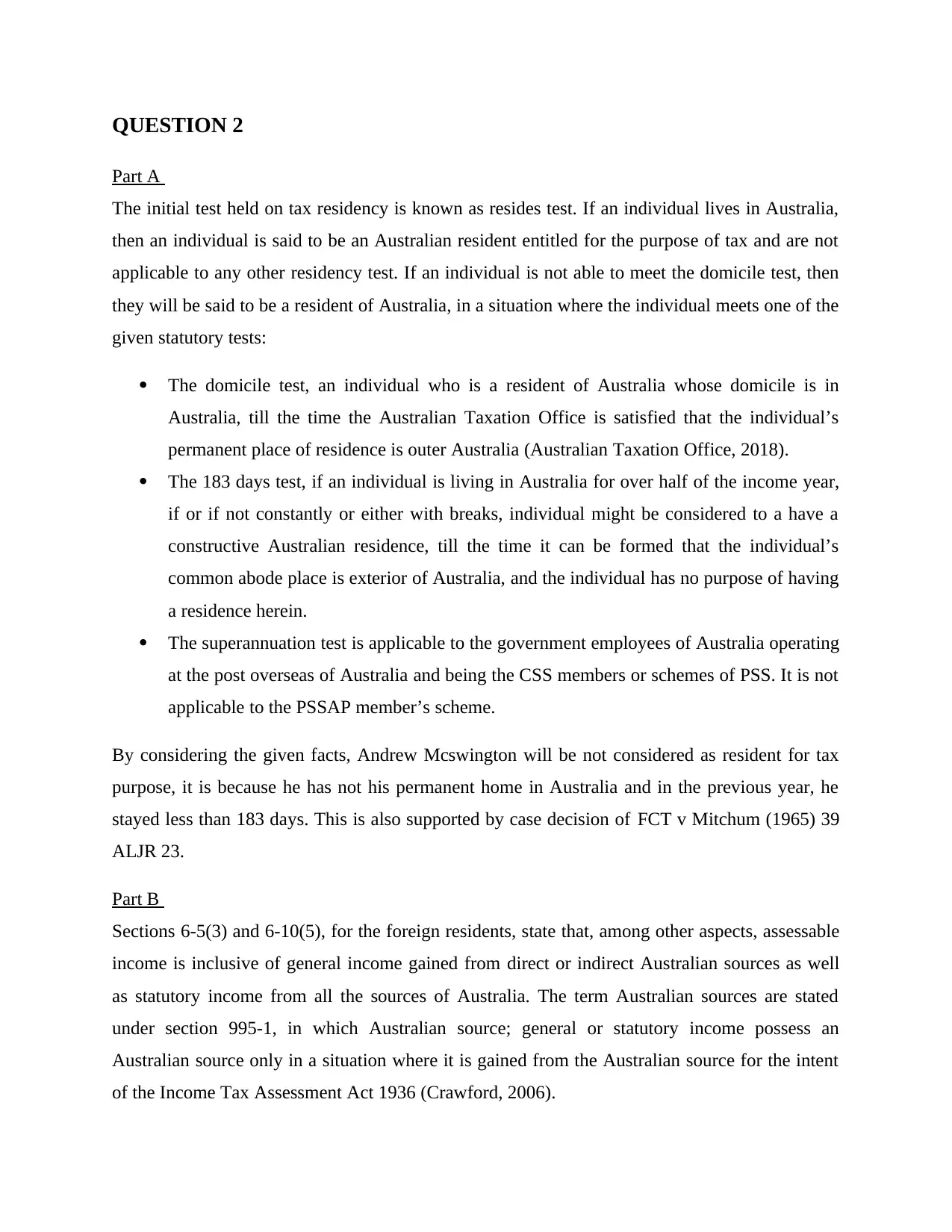
QUESTION 2
Part A
The initial test held on tax residency is known as resides test. If an individual lives in Australia,
then an individual is said to be an Australian resident entitled for the purpose of tax and are not
applicable to any other residency test. If an individual is not able to meet the domicile test, then
they will be said to be a resident of Australia, in a situation where the individual meets one of the
given statutory tests:
The domicile test, an individual who is a resident of Australia whose domicile is in
Australia, till the time the Australian Taxation Office is satisfied that the individual’s
permanent place of residence is outer Australia (Australian Taxation Office, 2018).
The 183 days test, if an individual is living in Australia for over half of the income year,
if or if not constantly or either with breaks, individual might be considered to a have a
constructive Australian residence, till the time it can be formed that the individual’s
common abode place is exterior of Australia, and the individual has no purpose of having
a residence herein.
The superannuation test is applicable to the government employees of Australia operating
at the post overseas of Australia and being the CSS members or schemes of PSS. It is not
applicable to the PSSAP member’s scheme.
By considering the given facts, Andrew Mcswington will be not considered as resident for tax
purpose, it is because he has not his permanent home in Australia and in the previous year, he
stayed less than 183 days. This is also supported by case decision of FCT v Mitchum (1965) 39
ALJR 23.
Part B
Sections 6-5(3) and 6-10(5), for the foreign residents, state that, among other aspects, assessable
income is inclusive of general income gained from direct or indirect Australian sources as well
as statutory income from all the sources of Australia. The term Australian sources are stated
under section 995-1, in which Australian source; general or statutory income possess an
Australian source only in a situation where it is gained from the Australian source for the intent
of the Income Tax Assessment Act 1936 (Crawford, 2006).
Part A
The initial test held on tax residency is known as resides test. If an individual lives in Australia,
then an individual is said to be an Australian resident entitled for the purpose of tax and are not
applicable to any other residency test. If an individual is not able to meet the domicile test, then
they will be said to be a resident of Australia, in a situation where the individual meets one of the
given statutory tests:
The domicile test, an individual who is a resident of Australia whose domicile is in
Australia, till the time the Australian Taxation Office is satisfied that the individual’s
permanent place of residence is outer Australia (Australian Taxation Office, 2018).
The 183 days test, if an individual is living in Australia for over half of the income year,
if or if not constantly or either with breaks, individual might be considered to a have a
constructive Australian residence, till the time it can be formed that the individual’s
common abode place is exterior of Australia, and the individual has no purpose of having
a residence herein.
The superannuation test is applicable to the government employees of Australia operating
at the post overseas of Australia and being the CSS members or schemes of PSS. It is not
applicable to the PSSAP member’s scheme.
By considering the given facts, Andrew Mcswington will be not considered as resident for tax
purpose, it is because he has not his permanent home in Australia and in the previous year, he
stayed less than 183 days. This is also supported by case decision of FCT v Mitchum (1965) 39
ALJR 23.
Part B
Sections 6-5(3) and 6-10(5), for the foreign residents, state that, among other aspects, assessable
income is inclusive of general income gained from direct or indirect Australian sources as well
as statutory income from all the sources of Australia. The term Australian sources are stated
under section 995-1, in which Australian source; general or statutory income possess an
Australian source only in a situation where it is gained from the Australian source for the intent
of the Income Tax Assessment Act 1936 (Crawford, 2006).
Paraphrase This Document
Need a fresh take? Get an instant paraphrase of this document with our AI Paraphraser
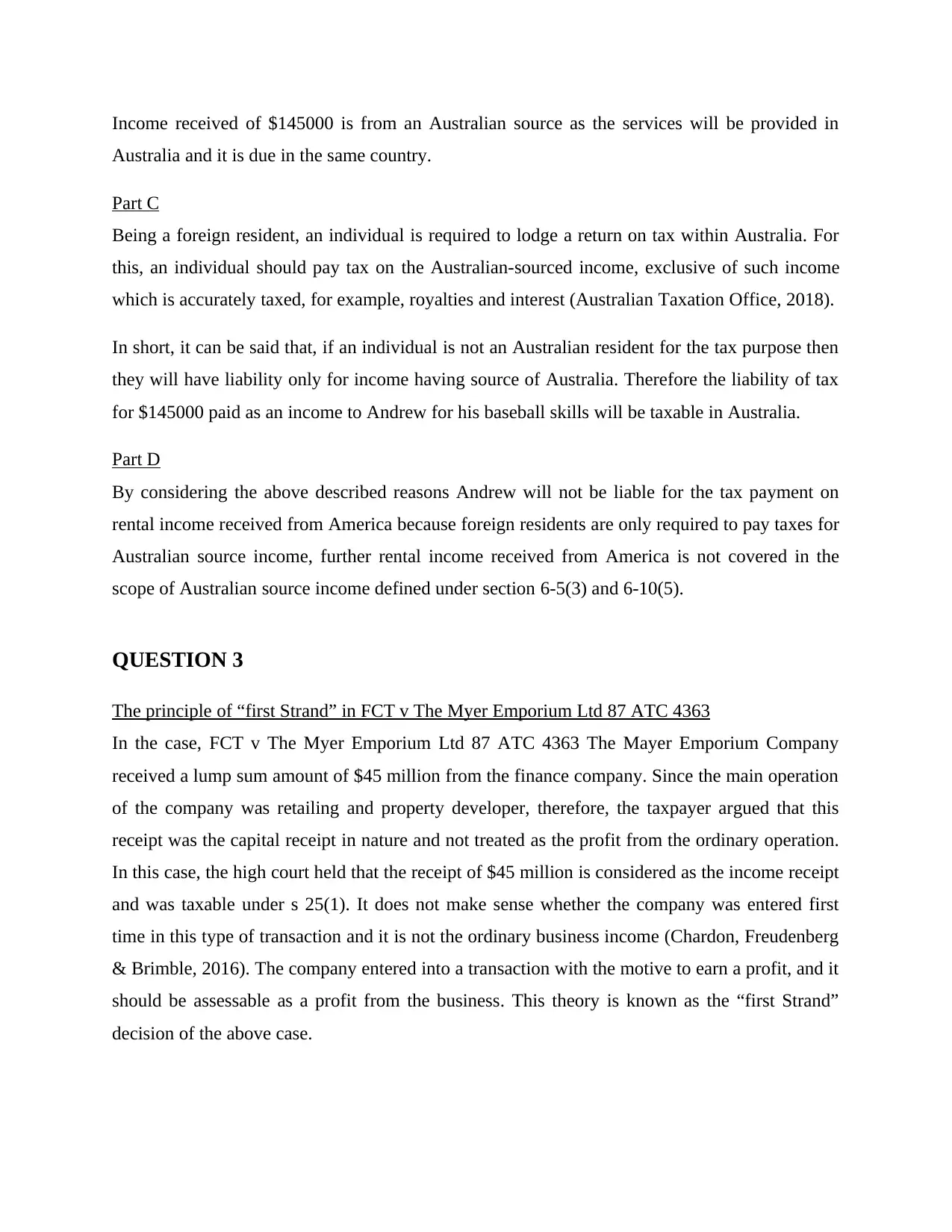
Income received of $145000 is from an Australian source as the services will be provided in
Australia and it is due in the same country.
Part C
Being a foreign resident, an individual is required to lodge a return on tax within Australia. For
this, an individual should pay tax on the Australian-sourced income, exclusive of such income
which is accurately taxed, for example, royalties and interest (Australian Taxation Office, 2018).
In short, it can be said that, if an individual is not an Australian resident for the tax purpose then
they will have liability only for income having source of Australia. Therefore the liability of tax
for $145000 paid as an income to Andrew for his baseball skills will be taxable in Australia.
Part D
By considering the above described reasons Andrew will not be liable for the tax payment on
rental income received from America because foreign residents are only required to pay taxes for
Australian source income, further rental income received from America is not covered in the
scope of Australian source income defined under section 6-5(3) and 6-10(5).
QUESTION 3
The principle of “first Strand” in FCT v The Myer Emporium Ltd 87 ATC 4363
In the case, FCT v The Myer Emporium Ltd 87 ATC 4363 The Mayer Emporium Company
received a lump sum amount of $45 million from the finance company. Since the main operation
of the company was retailing and property developer, therefore, the taxpayer argued that this
receipt was the capital receipt in nature and not treated as the profit from the ordinary operation.
In this case, the high court held that the receipt of $45 million is considered as the income receipt
and was taxable under s 25(1). It does not make sense whether the company was entered first
time in this type of transaction and it is not the ordinary business income (Chardon, Freudenberg
& Brimble, 2016). The company entered into a transaction with the motive to earn a profit, and it
should be assessable as a profit from the business. This theory is known as the “first Strand”
decision of the above case.
Australia and it is due in the same country.
Part C
Being a foreign resident, an individual is required to lodge a return on tax within Australia. For
this, an individual should pay tax on the Australian-sourced income, exclusive of such income
which is accurately taxed, for example, royalties and interest (Australian Taxation Office, 2018).
In short, it can be said that, if an individual is not an Australian resident for the tax purpose then
they will have liability only for income having source of Australia. Therefore the liability of tax
for $145000 paid as an income to Andrew for his baseball skills will be taxable in Australia.
Part D
By considering the above described reasons Andrew will not be liable for the tax payment on
rental income received from America because foreign residents are only required to pay taxes for
Australian source income, further rental income received from America is not covered in the
scope of Australian source income defined under section 6-5(3) and 6-10(5).
QUESTION 3
The principle of “first Strand” in FCT v The Myer Emporium Ltd 87 ATC 4363
In the case, FCT v The Myer Emporium Ltd 87 ATC 4363 The Mayer Emporium Company
received a lump sum amount of $45 million from the finance company. Since the main operation
of the company was retailing and property developer, therefore, the taxpayer argued that this
receipt was the capital receipt in nature and not treated as the profit from the ordinary operation.
In this case, the high court held that the receipt of $45 million is considered as the income receipt
and was taxable under s 25(1). It does not make sense whether the company was entered first
time in this type of transaction and it is not the ordinary business income (Chardon, Freudenberg
& Brimble, 2016). The company entered into a transaction with the motive to earn a profit, and it
should be assessable as a profit from the business. This theory is known as the “first Strand”
decision of the above case.
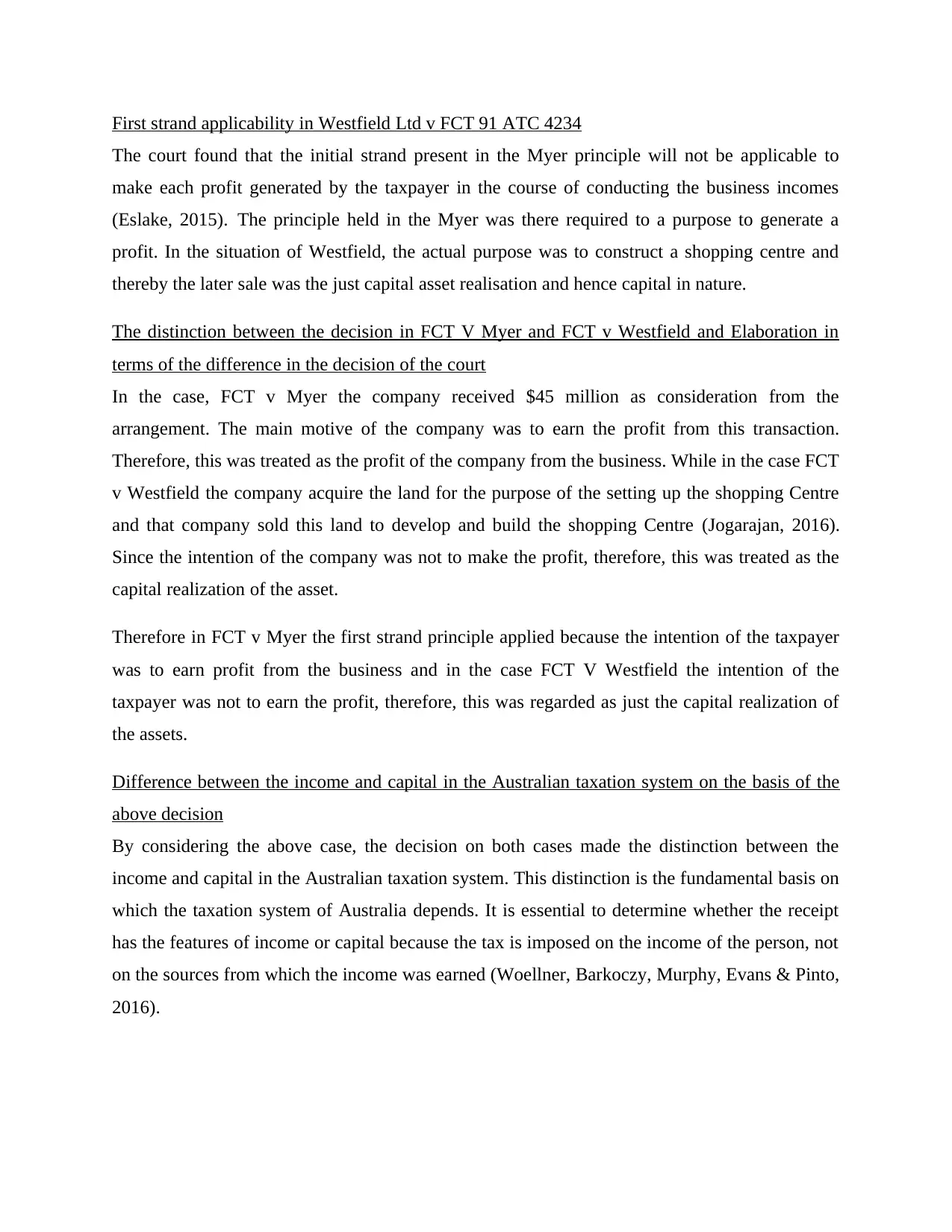
First strand applicability in Westfield Ltd v FCT 91 ATC 4234
The court found that the initial strand present in the Myer principle will not be applicable to
make each profit generated by the taxpayer in the course of conducting the business incomes
(Eslake, 2015). The principle held in the Myer was there required to a purpose to generate a
profit. In the situation of Westfield, the actual purpose was to construct a shopping centre and
thereby the later sale was the just capital asset realisation and hence capital in nature.
The distinction between the decision in FCT V Myer and FCT v Westfield and Elaboration in
terms of the difference in the decision of the court
In the case, FCT v Myer the company received $45 million as consideration from the
arrangement. The main motive of the company was to earn the profit from this transaction.
Therefore, this was treated as the profit of the company from the business. While in the case FCT
v Westfield the company acquire the land for the purpose of the setting up the shopping Centre
and that company sold this land to develop and build the shopping Centre (Jogarajan, 2016).
Since the intention of the company was not to make the profit, therefore, this was treated as the
capital realization of the asset.
Therefore in FCT v Myer the first strand principle applied because the intention of the taxpayer
was to earn profit from the business and in the case FCT V Westfield the intention of the
taxpayer was not to earn the profit, therefore, this was regarded as just the capital realization of
the assets.
Difference between the income and capital in the Australian taxation system on the basis of the
above decision
By considering the above case, the decision on both cases made the distinction between the
income and capital in the Australian taxation system. This distinction is the fundamental basis on
which the taxation system of Australia depends. It is essential to determine whether the receipt
has the features of income or capital because the tax is imposed on the income of the person, not
on the sources from which the income was earned (Woellner, Barkoczy, Murphy, Evans & Pinto,
2016).
The court found that the initial strand present in the Myer principle will not be applicable to
make each profit generated by the taxpayer in the course of conducting the business incomes
(Eslake, 2015). The principle held in the Myer was there required to a purpose to generate a
profit. In the situation of Westfield, the actual purpose was to construct a shopping centre and
thereby the later sale was the just capital asset realisation and hence capital in nature.
The distinction between the decision in FCT V Myer and FCT v Westfield and Elaboration in
terms of the difference in the decision of the court
In the case, FCT v Myer the company received $45 million as consideration from the
arrangement. The main motive of the company was to earn the profit from this transaction.
Therefore, this was treated as the profit of the company from the business. While in the case FCT
v Westfield the company acquire the land for the purpose of the setting up the shopping Centre
and that company sold this land to develop and build the shopping Centre (Jogarajan, 2016).
Since the intention of the company was not to make the profit, therefore, this was treated as the
capital realization of the asset.
Therefore in FCT v Myer the first strand principle applied because the intention of the taxpayer
was to earn profit from the business and in the case FCT V Westfield the intention of the
taxpayer was not to earn the profit, therefore, this was regarded as just the capital realization of
the assets.
Difference between the income and capital in the Australian taxation system on the basis of the
above decision
By considering the above case, the decision on both cases made the distinction between the
income and capital in the Australian taxation system. This distinction is the fundamental basis on
which the taxation system of Australia depends. It is essential to determine whether the receipt
has the features of income or capital because the tax is imposed on the income of the person, not
on the sources from which the income was earned (Woellner, Barkoczy, Murphy, Evans & Pinto,
2016).
⊘ This is a preview!⊘
Do you want full access?
Subscribe today to unlock all pages.

Trusted by 1+ million students worldwide
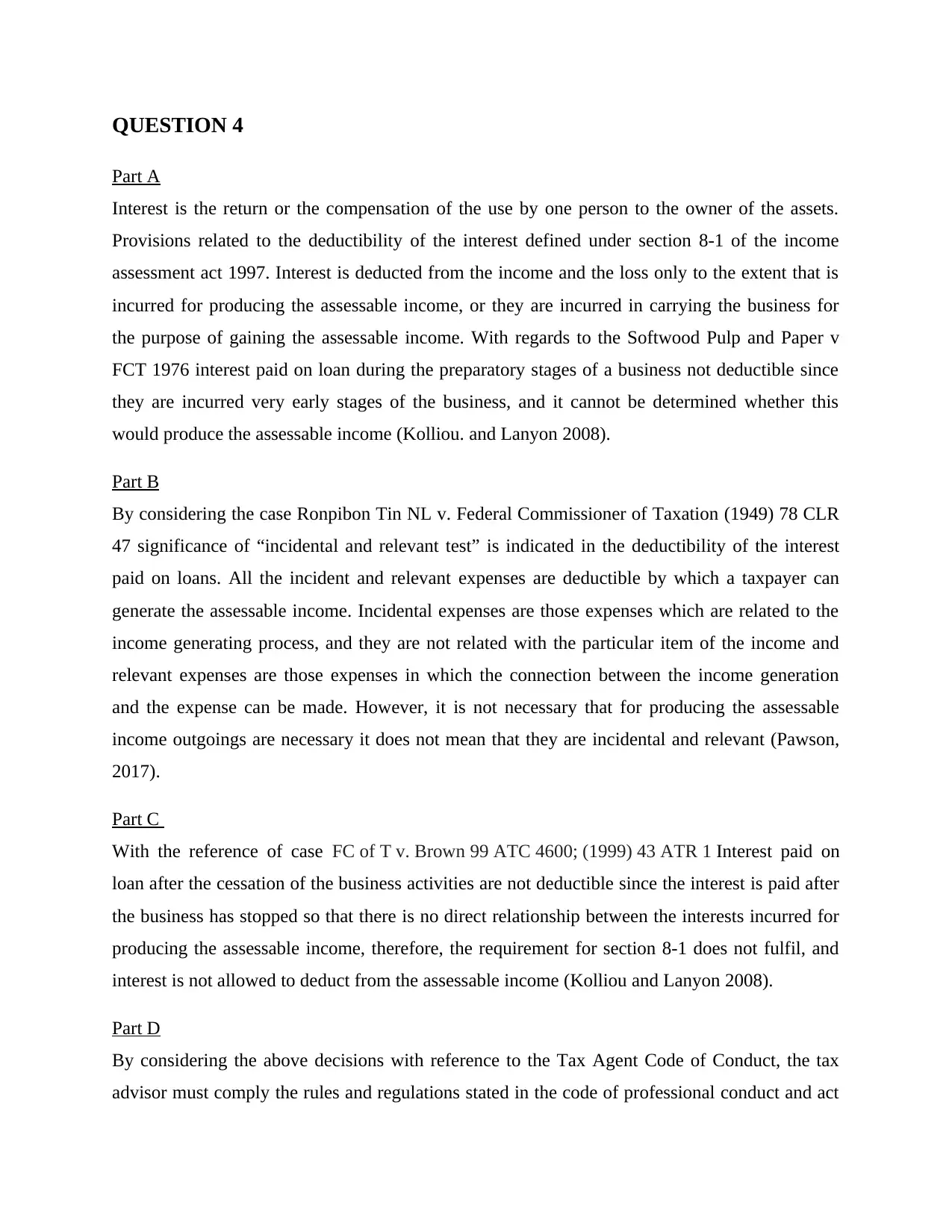
QUESTION 4
Part A
Interest is the return or the compensation of the use by one person to the owner of the assets.
Provisions related to the deductibility of the interest defined under section 8-1 of the income
assessment act 1997. Interest is deducted from the income and the loss only to the extent that is
incurred for producing the assessable income, or they are incurred in carrying the business for
the purpose of gaining the assessable income. With regards to the Softwood Pulp and Paper v
FCT 1976 interest paid on loan during the preparatory stages of a business not deductible since
they are incurred very early stages of the business, and it cannot be determined whether this
would produce the assessable income (Kolliou. and Lanyon 2008).
Part B
By considering the case Ronpibon Tin NL v. Federal Commissioner of Taxation (1949) 78 CLR
47 significance of “incidental and relevant test” is indicated in the deductibility of the interest
paid on loans. All the incident and relevant expenses are deductible by which a taxpayer can
generate the assessable income. Incidental expenses are those expenses which are related to the
income generating process, and they are not related with the particular item of the income and
relevant expenses are those expenses in which the connection between the income generation
and the expense can be made. However, it is not necessary that for producing the assessable
income outgoings are necessary it does not mean that they are incidental and relevant (Pawson,
2017).
Part C
With the reference of case FC of T v. Brown 99 ATC 4600; (1999) 43 ATR 1 Interest paid on
loan after the cessation of the business activities are not deductible since the interest is paid after
the business has stopped so that there is no direct relationship between the interests incurred for
producing the assessable income, therefore, the requirement for section 8-1 does not fulfil, and
interest is not allowed to deduct from the assessable income (Kolliou and Lanyon 2008).
Part D
By considering the above decisions with reference to the Tax Agent Code of Conduct, the tax
advisor must comply the rules and regulations stated in the code of professional conduct and act
Part A
Interest is the return or the compensation of the use by one person to the owner of the assets.
Provisions related to the deductibility of the interest defined under section 8-1 of the income
assessment act 1997. Interest is deducted from the income and the loss only to the extent that is
incurred for producing the assessable income, or they are incurred in carrying the business for
the purpose of gaining the assessable income. With regards to the Softwood Pulp and Paper v
FCT 1976 interest paid on loan during the preparatory stages of a business not deductible since
they are incurred very early stages of the business, and it cannot be determined whether this
would produce the assessable income (Kolliou. and Lanyon 2008).
Part B
By considering the case Ronpibon Tin NL v. Federal Commissioner of Taxation (1949) 78 CLR
47 significance of “incidental and relevant test” is indicated in the deductibility of the interest
paid on loans. All the incident and relevant expenses are deductible by which a taxpayer can
generate the assessable income. Incidental expenses are those expenses which are related to the
income generating process, and they are not related with the particular item of the income and
relevant expenses are those expenses in which the connection between the income generation
and the expense can be made. However, it is not necessary that for producing the assessable
income outgoings are necessary it does not mean that they are incidental and relevant (Pawson,
2017).
Part C
With the reference of case FC of T v. Brown 99 ATC 4600; (1999) 43 ATR 1 Interest paid on
loan after the cessation of the business activities are not deductible since the interest is paid after
the business has stopped so that there is no direct relationship between the interests incurred for
producing the assessable income, therefore, the requirement for section 8-1 does not fulfil, and
interest is not allowed to deduct from the assessable income (Kolliou and Lanyon 2008).
Part D
By considering the above decisions with reference to the Tax Agent Code of Conduct, the tax
advisor must comply the rules and regulations stated in the code of professional conduct and act
Paraphrase This Document
Need a fresh take? Get an instant paraphrase of this document with our AI Paraphraser
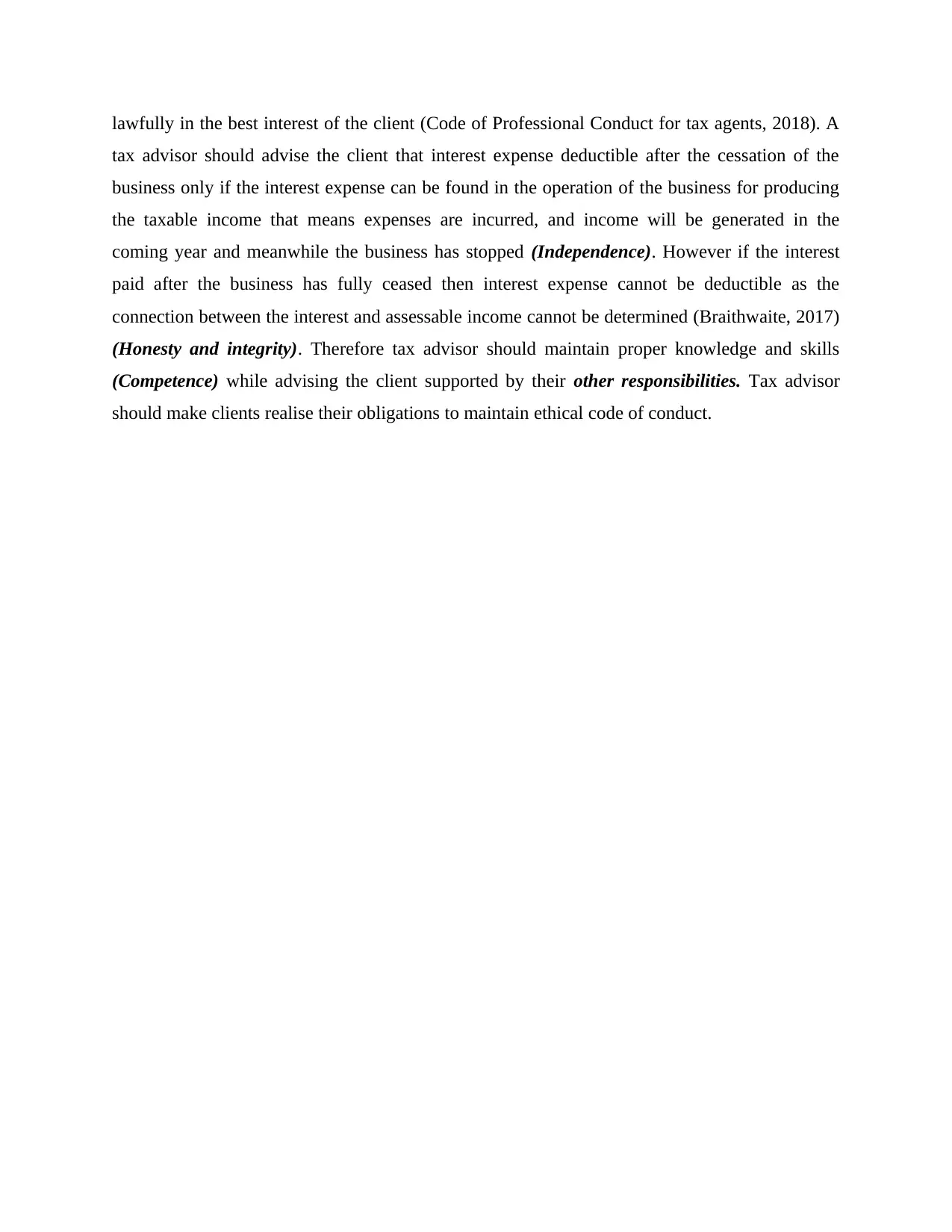
lawfully in the best interest of the client (Code of Professional Conduct for tax agents, 2018). A
tax advisor should advise the client that interest expense deductible after the cessation of the
business only if the interest expense can be found in the operation of the business for producing
the taxable income that means expenses are incurred, and income will be generated in the
coming year and meanwhile the business has stopped (Independence). However if the interest
paid after the business has fully ceased then interest expense cannot be deductible as the
connection between the interest and assessable income cannot be determined (Braithwaite, 2017)
(Honesty and integrity). Therefore tax advisor should maintain proper knowledge and skills
(Competence) while advising the client supported by their other responsibilities. Tax advisor
should make clients realise their obligations to maintain ethical code of conduct.
tax advisor should advise the client that interest expense deductible after the cessation of the
business only if the interest expense can be found in the operation of the business for producing
the taxable income that means expenses are incurred, and income will be generated in the
coming year and meanwhile the business has stopped (Independence). However if the interest
paid after the business has fully ceased then interest expense cannot be deductible as the
connection between the interest and assessable income cannot be determined (Braithwaite, 2017)
(Honesty and integrity). Therefore tax advisor should maintain proper knowledge and skills
(Competence) while advising the client supported by their other responsibilities. Tax advisor
should make clients realise their obligations to maintain ethical code of conduct.
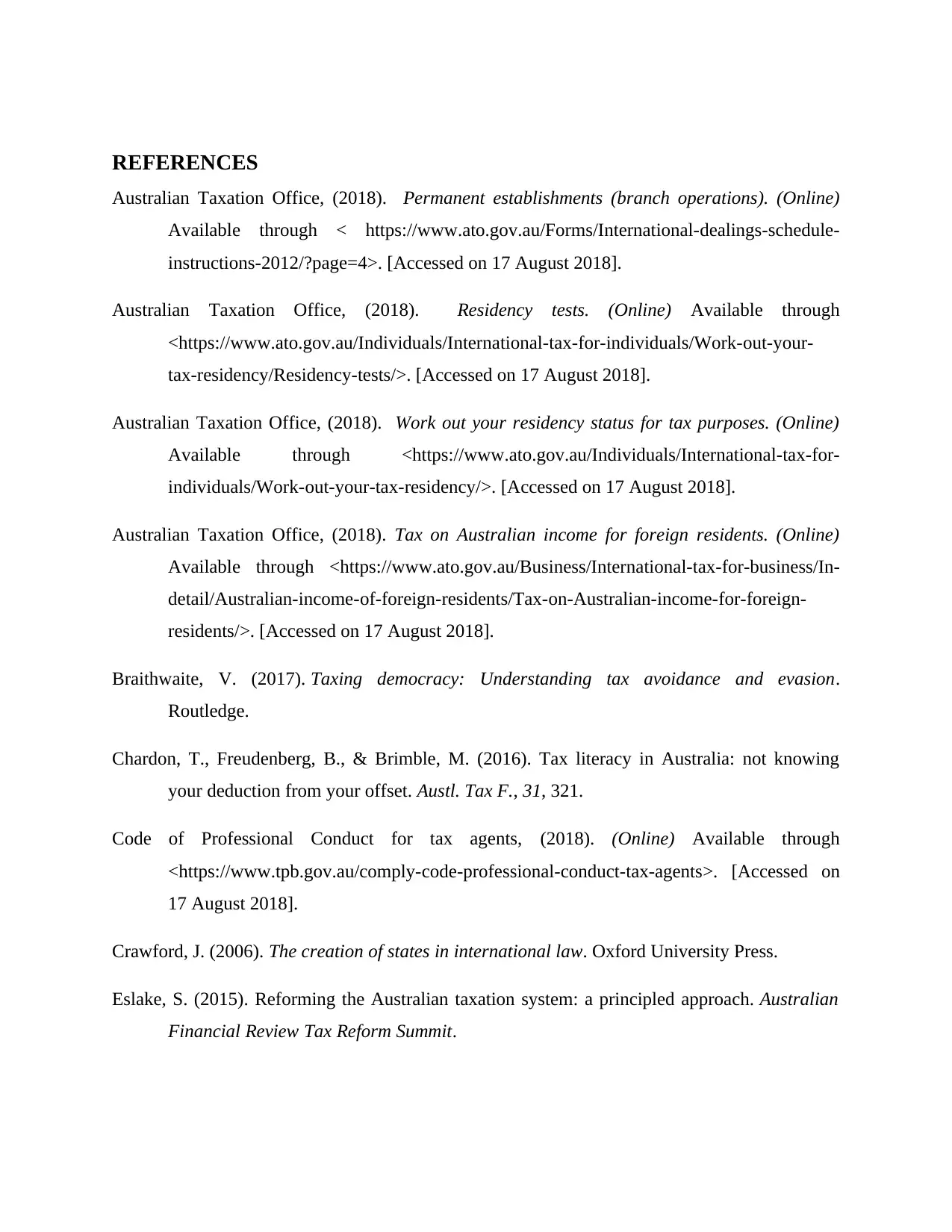
REFERENCES
Australian Taxation Office, (2018). Permanent establishments (branch operations). (Online)
Available through < https://www.ato.gov.au/Forms/International-dealings-schedule-
instructions-2012/?page=4>. [Accessed on 17 August 2018].
Australian Taxation Office, (2018). Residency tests. (Online) Available through
<https://www.ato.gov.au/Individuals/International-tax-for-individuals/Work-out-your-
tax-residency/Residency-tests/>. [Accessed on 17 August 2018].
Australian Taxation Office, (2018). Work out your residency status for tax purposes. (Online)
Available through <https://www.ato.gov.au/Individuals/International-tax-for-
individuals/Work-out-your-tax-residency/>. [Accessed on 17 August 2018].
Australian Taxation Office, (2018). Tax on Australian income for foreign residents. (Online)
Available through <https://www.ato.gov.au/Business/International-tax-for-business/In-
detail/Australian-income-of-foreign-residents/Tax-on-Australian-income-for-foreign-
residents/>. [Accessed on 17 August 2018].
Braithwaite, V. (2017). Taxing democracy: Understanding tax avoidance and evasion.
Routledge.
Chardon, T., Freudenberg, B., & Brimble, M. (2016). Tax literacy in Australia: not knowing
your deduction from your offset. Austl. Tax F., 31, 321.
Code of Professional Conduct for tax agents, (2018). (Online) Available through
<https://www.tpb.gov.au/comply-code-professional-conduct-tax-agents>. [Accessed on
17 August 2018].
Crawford, J. (2006). The creation of states in international law. Oxford University Press.
Eslake, S. (2015). Reforming the Australian taxation system: a principled approach. Australian
Financial Review Tax Reform Summit.
Australian Taxation Office, (2018). Permanent establishments (branch operations). (Online)
Available through < https://www.ato.gov.au/Forms/International-dealings-schedule-
instructions-2012/?page=4>. [Accessed on 17 August 2018].
Australian Taxation Office, (2018). Residency tests. (Online) Available through
<https://www.ato.gov.au/Individuals/International-tax-for-individuals/Work-out-your-
tax-residency/Residency-tests/>. [Accessed on 17 August 2018].
Australian Taxation Office, (2018). Work out your residency status for tax purposes. (Online)
Available through <https://www.ato.gov.au/Individuals/International-tax-for-
individuals/Work-out-your-tax-residency/>. [Accessed on 17 August 2018].
Australian Taxation Office, (2018). Tax on Australian income for foreign residents. (Online)
Available through <https://www.ato.gov.au/Business/International-tax-for-business/In-
detail/Australian-income-of-foreign-residents/Tax-on-Australian-income-for-foreign-
residents/>. [Accessed on 17 August 2018].
Braithwaite, V. (2017). Taxing democracy: Understanding tax avoidance and evasion.
Routledge.
Chardon, T., Freudenberg, B., & Brimble, M. (2016). Tax literacy in Australia: not knowing
your deduction from your offset. Austl. Tax F., 31, 321.
Code of Professional Conduct for tax agents, (2018). (Online) Available through
<https://www.tpb.gov.au/comply-code-professional-conduct-tax-agents>. [Accessed on
17 August 2018].
Crawford, J. (2006). The creation of states in international law. Oxford University Press.
Eslake, S. (2015). Reforming the Australian taxation system: a principled approach. Australian
Financial Review Tax Reform Summit.
⊘ This is a preview!⊘
Do you want full access?
Subscribe today to unlock all pages.

Trusted by 1+ million students worldwide
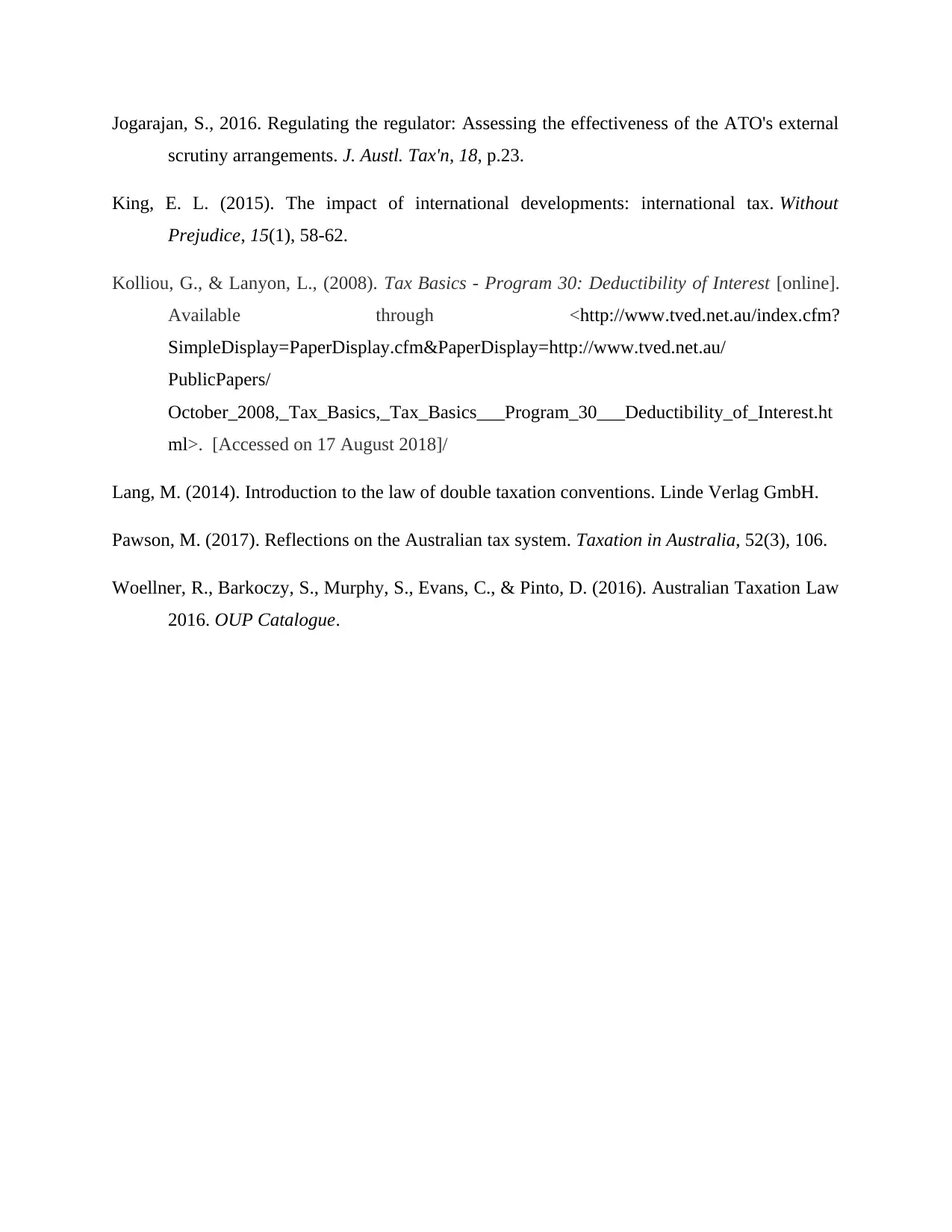
Jogarajan, S., 2016. Regulating the regulator: Assessing the effectiveness of the ATO's external
scrutiny arrangements. J. Austl. Tax'n, 18, p.23.
King, E. L. (2015). The impact of international developments: international tax. Without
Prejudice, 15(1), 58-62.
Kolliou, G., & Lanyon, L., (2008). Tax Basics - Program 30: Deductibility of Interest [online].
Available through <http://www.tved.net.au/index.cfm?
SimpleDisplay=PaperDisplay.cfm&PaperDisplay=http://www.tved.net.au/
PublicPapers/
October_2008,_Tax_Basics,_Tax_Basics___Program_30___Deductibility_of_Interest.ht
ml>. [Accessed on 17 August 2018]/
Lang, M. (2014). Introduction to the law of double taxation conventions. Linde Verlag GmbH.
Pawson, M. (2017). Reflections on the Australian tax system. Taxation in Australia, 52(3), 106.
Woellner, R., Barkoczy, S., Murphy, S., Evans, C., & Pinto, D. (2016). Australian Taxation Law
2016. OUP Catalogue.
scrutiny arrangements. J. Austl. Tax'n, 18, p.23.
King, E. L. (2015). The impact of international developments: international tax. Without
Prejudice, 15(1), 58-62.
Kolliou, G., & Lanyon, L., (2008). Tax Basics - Program 30: Deductibility of Interest [online].
Available through <http://www.tved.net.au/index.cfm?
SimpleDisplay=PaperDisplay.cfm&PaperDisplay=http://www.tved.net.au/
PublicPapers/
October_2008,_Tax_Basics,_Tax_Basics___Program_30___Deductibility_of_Interest.ht
ml>. [Accessed on 17 August 2018]/
Lang, M. (2014). Introduction to the law of double taxation conventions. Linde Verlag GmbH.
Pawson, M. (2017). Reflections on the Australian tax system. Taxation in Australia, 52(3), 106.
Woellner, R., Barkoczy, S., Murphy, S., Evans, C., & Pinto, D. (2016). Australian Taxation Law
2016. OUP Catalogue.
1 out of 10
Related Documents
Your All-in-One AI-Powered Toolkit for Academic Success.
+13062052269
info@desklib.com
Available 24*7 on WhatsApp / Email
![[object Object]](/_next/static/media/star-bottom.7253800d.svg)
Unlock your academic potential
Copyright © 2020–2026 A2Z Services. All Rights Reserved. Developed and managed by ZUCOL.





